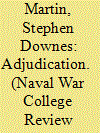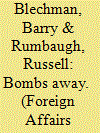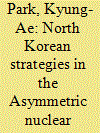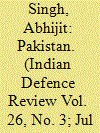| Srl | Item |
| 1 |
ID:
133382


|
|
|
|
|
| Publication |
2014.
|
| Summary/Abstract |
Commonly used war-game adjudication methods break down and create unreliable results when addressing novel operational or strategic problems for which we have little experience or data (for example, information warfare or a regional nuclear conflict) and when we wish to explore situations rather than educate officers about well-understood situations. The primary causes of this breakdown are, first, the incorrect assumption that adjudicators are impartial controllers instead of dominant players and, second, the design choice to make the players' decisions the game's primary output. Among the many reasons for war gaming (such as research and analysis, training, education, and discovery), this article focuses on "discovery" war games, where the objective is to find out something previously unknown about a novel operational or strategic problem, something that cannot be better discovered by other methods, such as seminars, work groups, modeling and simulation, or operations research.
|
|
|
|
|
|
|
|
|
|
|
|
|
|
|
|
| 2 |
ID:
132165


|
|
|
|
|
| Publication |
2014.
|
| Summary/Abstract |
In 1991, U.S. President George H. W. Bush decided to retire almost all the tactical nuclear weapons operated by the U.S. Army and the U.S. Navy. His reasons were simple: these short-range weapons were militarily useless and imposed significant burdens on the armed forces in terms of money, manpower, and time. Twenty-three years later, only one type of tactical nuclear weapon remains in the U.S. inventory: the B-61 gravity bomb. In addition to the several hundred B-61s located at home, the United States currently deploys around 180 of them in Europe, at bases in Belgium, Germany, Italy, the Netherlands, and Turkey. In the event of a nuclear conflict on the continent, NATO would deliver the bombs via U.S.-built F-15 or F-16 aircraft or European-built Tornado fighters, operated by some combination of Belgian, Dutch, German, Italian, and U.S. crews. Originally intended to prevent Soviet forces from penetrating Western Europe, the planes could travel as far east as Russia. But owing to their slower speed and lower altitude, they would be much more vulnerable to Russia's ground-based air defenses than would longer-range strategic bombers and missiles.
|
|
|
|
|
|
|
|
|
|
|
|
|
|
|
|
| 3 |
ID:
096028


|
|
|
| 4 |
ID:
106865


|
|
|
| 5 |
ID:
097314


|
|
|
|
|
| Publication |
2010.
|
| Summary/Abstract |
The robustness of India's nuclear doctrine would face a severe challenge in the case of conventional military offensives into Pakistan in a future Indo-Pak conflict. Such offensives are possible in case Pakistan's nuclear threshold is taken as high and its doctrine one of 'last resort'. However, Pakistani nuclear use options may include lower order nuclear use. In light of this, it recommends that India take a serious look at the Limited War concept as well as revise its nuclear doctrine to 'flexible nuclear retaliation'. It suggests the 'Sundarji doctrine' as a possible option for the latter and recommends institution of a strategic dialogue mechanism with Pakistan to ensure nuclear conflict limitation.
|
|
|
|
|
|
|
|
|
|
|
|
|
|
|
|
| 6 |
ID:
120339


|
|
|
| 7 |
ID:
110176


|
|
|